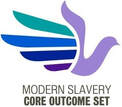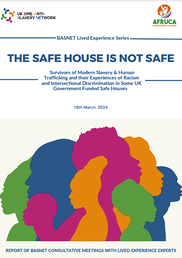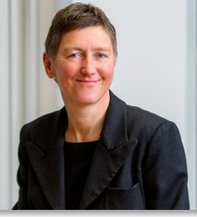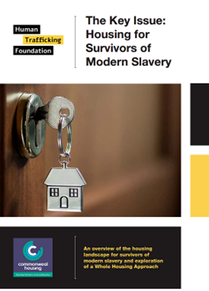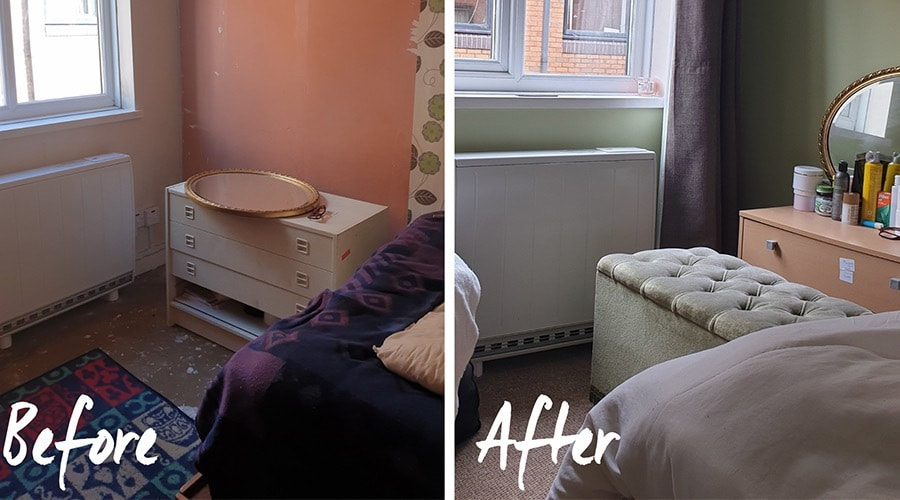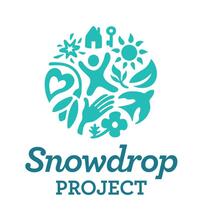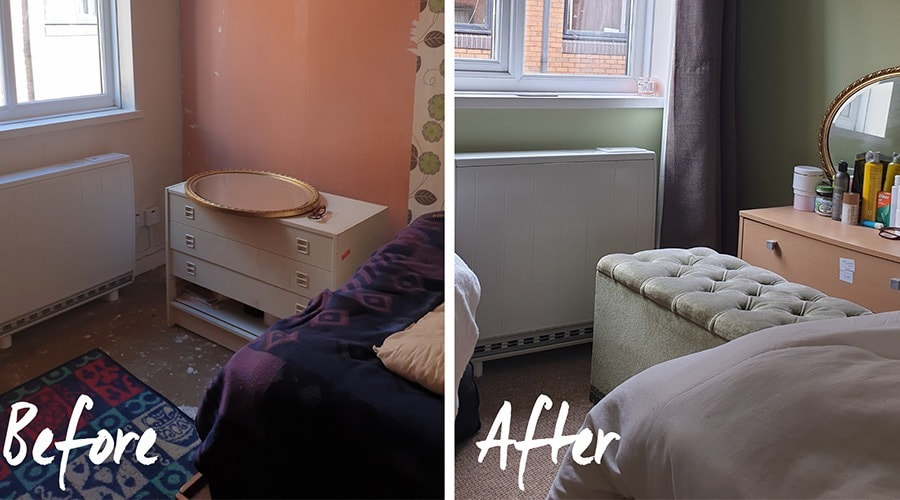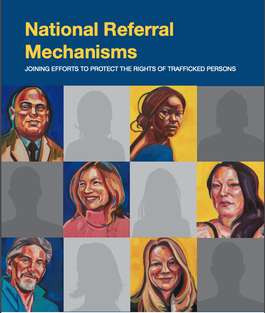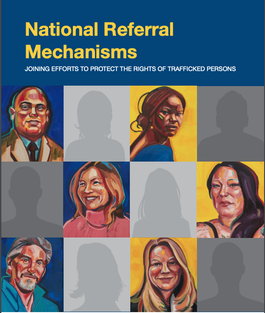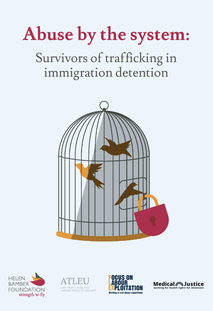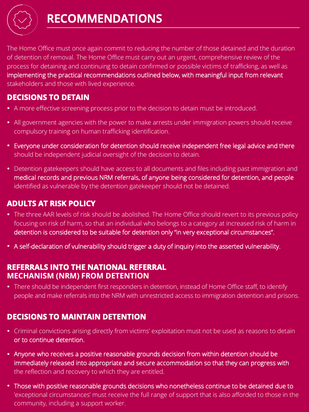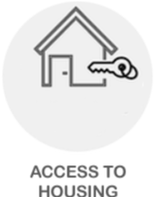"Housing needs to be available and also secure and suitable for survivors to provide fundamental stability; it gives you the opportunity to focus your mind on recovery and finding your own life again."
"Housing needs to be available and also secure and suitable for survivors to provide fundamental stability; it gives you the opportunity to focus your mind on recovery and finding your own life again."
x
A survivor told me that the first time they were put in a safehouse it wasn’t in any way safe for them. They were mistreated, there was racial discrimination, lack of support, no provision of interpreters or translation. They suffered from other residents who were homophobic. I know myself that discrimination against LGBTQIA people can be far less outside certain safehouses compared to being inside certain safehouses – there are people of various backgrounds, cultures and beliefs, and there is no overriding policy or person telling them clearly not to discriminate. It was so sad because this survivor ended up going back to his traffickers, back into sexual exploitation. Safety should be guaranteed in the so-called safehouses. It is particularly unsafe for the houses to also be for people who are not victims of trafficking, which can create risks of re-trafficking. For example, survivors may share with others who are brought in who may be drug dealers or people running away from people they owe money. When they get into the safehouse, they don’t stop whatever they are doing – for example, they may carry on selling drugs. Some have all this money, and if you are a vulnerable person, they can recruit you into the ‘job’ they are doing. |
x
For a safehouse to be ‘safe’, it should be safe enough for that survivor to have piece of mind. I think that is one of the most important things. I have come across a lot of survivors who are in, and have been in safehouses, and the most heartbreaking thing they always talk about is the lack of piece of mind. Secure, suitable housing – a survivor should be able to go into their room, sleep and feel safe and get the right amount of sleep that they need, that any human being deserves to have at night. If a female survivor is being taken to a safehouse, let it be a female-only safehouse. Let it be secure enough that if a survivor has a query, or if they have to clarify certain things about their safety, they should feel confident and have no fear of anything being used against them – actually being able to ask questions and being able to speak. Secure and suitable housing means being able to have a shower in a clean bathroom, being able to cook their meals in a clean, adequate, hygienic kitchen. A survivor should be able to eat comfortably, with piece of mind, without having to see mice running around, or having to prepare themselves with hand-sanitiser without touching the handles in the safehouse or the accommodation they have been given. If a survivor goes to the council they should get something that meets the basic standard for any human. |
|
Brook describes the differences between two safehouses. |
x
I was in a safe house where they accommodated men and women all together. A lot of crime takes place in there - there are other perpetrators living with you. One man in there had served 2 years in prison for a stabbing. He was taking drugs, bringing in girlfriends - it wasn't a safe house at all for me. Another man was dealing in stolen cars, and he brought in different women - one of the women threatened to harm us.
The conditions were filthy with unwashed and stained bed linen. The Manager and Support worker offered no help - if I asked they would just say they couldn't do anything, and they were afraid of the Home Office finding out. They told me to 'put it in writing' but I didn't have the vision for writing due to my health condition - they knew this but wouldn't help me to write it.
Two women and five men, and it was called a safe house - the men were notorious criminals. If you complain you are treated like a criminal yourself. The manager didn't even come to say hello after I became ill and had to stay in hospital - I wasn't eating because I was scared to go to the kitchen because of the violence - a man had been violent to me in the kitchen. I wasn't protected at all.
Eventually my doctor enabled me to be moved on health grounds, they were worried. I got help as well from another organisation. In my new accommodation I am no longer crying everyday and I can get some sleep. When I entered the room, there was a towel, toiletries, clean bedding.
I opened the drawer and found some clothes there, shower gel and sponges and facecloth. There was nothing provided at the previous house at all, not even cooking utensils or pots to cook in. The residents are all women here - I talk to them, we laugh, we are in the kitchen, we taste each other's food and eat together. Once a month we go to the main office to collect different types of items: clothes, shoes, coats, toys, curtains, toiletries, beddings, paintings you name it all for free and at the other safehouse residents got nothing.
Around Christmas in the new safe house we received Christmas hampers, £30 Asda vouchers each and a large Christmas gift bag with a gown, plus toiletries, gloves etc. Last year was my first Christmas in the new safe house and I was overwhelmed with the presents I received because I have never in my entire life received so many gifts before. I am very grateful to the management of my new safehouse, they know how to make you feel loved and accepted in society.
The conditions were filthy with unwashed and stained bed linen. The Manager and Support worker offered no help - if I asked they would just say they couldn't do anything, and they were afraid of the Home Office finding out. They told me to 'put it in writing' but I didn't have the vision for writing due to my health condition - they knew this but wouldn't help me to write it.
Two women and five men, and it was called a safe house - the men were notorious criminals. If you complain you are treated like a criminal yourself. The manager didn't even come to say hello after I became ill and had to stay in hospital - I wasn't eating because I was scared to go to the kitchen because of the violence - a man had been violent to me in the kitchen. I wasn't protected at all.
Eventually my doctor enabled me to be moved on health grounds, they were worried. I got help as well from another organisation. In my new accommodation I am no longer crying everyday and I can get some sleep. When I entered the room, there was a towel, toiletries, clean bedding.
I opened the drawer and found some clothes there, shower gel and sponges and facecloth. There was nothing provided at the previous house at all, not even cooking utensils or pots to cook in. The residents are all women here - I talk to them, we laugh, we are in the kitchen, we taste each other's food and eat together. Once a month we go to the main office to collect different types of items: clothes, shoes, coats, toys, curtains, toiletries, beddings, paintings you name it all for free and at the other safehouse residents got nothing.
Around Christmas in the new safe house we received Christmas hampers, £30 Asda vouchers each and a large Christmas gift bag with a gown, plus toiletries, gloves etc. Last year was my first Christmas in the new safe house and I was overwhelmed with the presents I received because I have never in my entire life received so many gifts before. I am very grateful to the management of my new safehouse, they know how to make you feel loved and accepted in society.
"When considering standards for secure and appropriate accommodation, it is vital to remember the increasing number of survivors of trafficking who are being detained for an indefinite period of time...
This is due to concerning policy changes from the UK Government which look likely to worsen. This report 'Abuse by the System: Survivors of Trafficking in Immigration Detention' evidenced that the number of referrals into the NRM from detention tripled between 2017 (501) and 2021 (1611)."
Beth Mullen-Feroze, Chair of the Taskforce on Victims of Human Trafficking in Immigration Detention
x
"Immigration detention is an unacceptable environment for survivors of trafficking, who are particularly vulnerable to harm in detention, a setting which can prevent or discourage disclosure. Even if identified, detainees are not always released and detention continues to have an accumulative and damaging impact upon their physical and mental health. A high proportion of immigration detainees are diagnosed with depression, post-traumatic stress disorder (PTSD) and anxiety, and a significant number experience suicidal ideation with the risk of self-harm. In addition to this survivors who are detained are provided with limited support to aid their recovery, compared with those in the community, and any support is provided by Home Office officials rather than an independent support worker. It is impossible to envisage how a person’s recovery needs can be met when they are in continuous distress.
Our report (see 'Helpful Resources' below) calls for an urgent review of the process for detaining and continuing to detain confirmed or possible victims of trafficking as well as a call for the various practical recommendations to be implemented. The concerns raised in our report were echoed in the third review of the Adults at Risk policy by the Independent Chief Inspector of Borders and Immigration."
Our report (see 'Helpful Resources' below) calls for an urgent review of the process for detaining and continuing to detain confirmed or possible victims of trafficking as well as a call for the various practical recommendations to be implemented. The concerns raised in our report were echoed in the third review of the Adults at Risk policy by the Independent Chief Inspector of Borders and Immigration."
MSCOS study descriptor: Survivors should live in a place they can call home, where they feel safe and secure, can exercise freedom and independence, and live without suffering, abuse, or exploitation. Housing should offer private personal space, be hygienic, have enough peace to be able to rest and sleep, and preclude worries about being evicted. Key outcome features include: safe house accommodation being gender-sensitive, allowing for the proper investigation of complaints, having cooking and cleaning facilities, not being overcrowded, and being a place where survivors feel respected.
Relevant Practice Models and Frameworks
for secure and suitable housing
for secure and suitable housing
Licensing and Housing
The UK BME Anti-Slavery Network (BASNET) have undertaken a consultative exercise withthirteen lived experience experts on the cause of concern foun in government funded safe houses. This consultative exercise marks the first in BASNET’s Lived Experience Series, focusing on the experiences of survivors of modern slavery, exploitation, and human trafficking in the UK.The Safe House Is Not Safe report emphasises the need for improvement by highlighting the concerns expressed by the survivors regarding inadequate service provisions and the exacerbation of their vulnerabilities during the recovery process due to intersectional discrimination of racism linked with mysogynoir, transphobia and homophobia.
x
The key emerging issues outlined in the report based on the experiences of the 13 survivors, include:
- Discrimination by Staff: Participants experienced discriminatory treatments based on their race, gender, ethnicity, religion, and sexual orientation.
- Sexual Exploitation and Harassment: Instances of sexual exploitation and harassment were reported, raising concerns about residents' safety.
- Poor State of Safe Houses: Participants reported structural defects, rat infestations and absence of safety protocols.
- Poor Complaint Handling Procedure: Complaints were not consistently followed up, and participants reported feeling victimised when raising concerns.
- Cultural Inclusivity: Participants emphasised the need for a more culturally sensitive and victim centred approach in the operation of safe houses.
- Complaints and Feedback Mechanism: A robust mechanism for survivors to lodge complaints and provide feedback to ensure accountability and continuous improvement in service delivery.
- Survivors' Entitlements: Clear communication of residents' rights and entitlements under the National Referral Mechanism.
- Training for Workers: Recommendation that workers and managers in safe houses are adequately trained to understand the nuances of modern slavery and the experiences of victims, in addition to training for both staff and residents on cultural sensitivity, so the right support can be provided for all survivors.
- Trauma Informed Care and Support: Participants stressed the importance of prioritising the mental health of survivors through the provision of more empathetic services and kind-hearted support that meet their individual needs and address the unique challenges faced by each survivors.
Licensing and Housing
|
The draft Houses in Multiple Occupation (Asylum Seeker Accommodation) (England) Regulations 2023 will amend section 254 of the Housing Act 2004 so that a building is not defined as, a house in multiple occupation…if…it is occupied solely or principally by asylum-seekers or members of their household.
|
The Key Issue: Housing for Survivors of Modern Slavery is hot off the press! This report is a collaboration between the Human Trafficking Foundation and Commonweal Housing Trust, the Lived Experience Advisory Panel (LEAP) and other partners.
|
|
x
“Without any consultation, the UK Government has laid a draft statutory instrument which will deprive people who are in asylum accommodation from the protective measures regulating multiple occupation housing (HMOs) under the 2004 Housing Act. In simple terms, asylum seekers’ accommodation will not be licenced or have any outside regulation in relation to its condition. This means that the only regulation people claiming asylum will have is contained in the contractual terms between their accommodation provider and the Government’s Home Office.
Normally the landlord of an HMO is required to obtain a licence by meeting a number of conditions about fire, electrical, carbon monoxide and gas safety, size of the rooms, number of people in rooms, facilities etc. The enforcement of HMO licencing lies with Local Authorities and not the state, and many councils go further to require landlords to meet enhanced conditions. HMO licencing is a vital safeguard for people living in poor, overcrowded and insanitary housing. Asylum applicants are often living in the very worst conditions and HMO enforcement is one of the few tools available to local authorities and representatives of asylum seekers to help raise conditions. If this tool is removed, there is a very real risk that conditions will deteriorate further and become actively dangerous for occupants.” |
x
The Key Issue: Housing for Survivors of Modern Slavery aims to raise the profile of the housing injustice that both British and foreign national survivors of modern slavery experience in England and Wales and examines whether the Whole Housing Approach (WHA) to domestic abuse could be used as a framework to provide solutions to improve housing options for survivors of modern slavery.
It offers a series of solid recommendations for significant improvements to policy and practice across the housing spectrum. This includes the recommendation, relevant to this week’s feature, that: "The Government should fund a Modern Slavery Lead role for each local authority. In the interim, the statutory guidance should be updated to require each local authority to identify modern slavery Single Points of Contact (SPOCs) in the safeguarding, housing, community safety and licensing teams to fill the gap and work collaboratively with local partners to ensure smooth transitions for survivors" |
|
Preventing Homelessness To read more about The Passage Modern Slavery Toolkit, click below
x
The Passage Modern Slavery Toolkit seeks to encourage local authorities to take a Multi-Agency Case Conference (MACC) approach. We have led the way with this approach in Westminster, working in partnership with Westminster City Council, Crisis and DLUHC and it is encouraging to see that other local authorities are now adopting this. The toolkit has been developed to equip homelessness organisations, local authorities and frontline workers with templates and documentation to create modern slavery services and multi-agency partnerships. Councils might also find these documents helpful to consider for a wider cohort of vulnerable adults. It is recommended that practitioners complete The Passage Modern Slavery Training Programme in order to implement this toolkit effectively. The Passage Modern Slavery Toolkit is formed of five sections, each containing the templates and documentation needed to create multi-agency partnerships to support victims of modern slavery at the point of identification, and to provide frontline support to survivors:
“Partnership work between frontline charities and local authorities is imperative to support survivors of modern slavery. Based on the success of the MACC approach, The Passage produced this toolkit to support other charities and local authorities to create their own modern slavery service and to do multi-agency work in a formalised way. Together, we can build a better support network for survivors of modern slavery. We would like to recognise the invaluable assistance of Westminster City Council, the Home Office Modern Slavery Unit, the Independent Anti-Slavery Commissioner’s Office, Human Trafficking Foundation, Local Government Association, Greater London Authority, Homeless Link, Crisis and St Mary’s University.” Dr Julia Tomas, Anti-Slavery Coordinator, The Passage “In addition to our operational work, we have also been focused on addressing systemic issues regarding the link between homelessness and modern slavery. We established a ‘Task and Finish’ Group including central government, the Independent Anti-Slavery Commissioner, The Centre for Social Justice and other charity partners which has enabled the continued review of the links between homelessness and modern slavery, while developing strong working relationships across the sector.” Mick Clarke, Chief Executive, The Passage |
Internal Accommodation Standards To read more about Snowdrop Project's House Renovation project, click below
x
When survivors are entitled to access permanent accommodation, usually through the local authority, the state of the accommodation varies, but all are unfurnished and in need of a deep clean at minimum. We have found this transition presents another knife edge to a survivor’s stability and recovery. In order to address this need, we work with the survivor, and enlist a team of renovation volunteers to help clean, paint, furnish their house to make it into a safe and comfortable home. “When I went there with my two children I cried from joy, I couldn’t believe my eyes that that was my house. It was all completed, all furnished, including a fully fitted kitchen. My children were so very happy. I don’t know what more to say.” Agata* We believe that stable and safe accommodation is a basic need, without which, survivors can seriously struggle to move into independence. We want to help the client to create a place they can call home with pride and dignity. “When I first got my council housing, it was really a disaster... They [Snowdrop] painted the house, they furnished two rooms for the children as well as my room. They ensured everything I needed in the kitchen was there. The house eventually was made very warm and pleasant.” |
Helpful Resources
NRM Handbook
To read more about the NRM Handbook, click here
x
|
Victims of Trafficking in Detention
This report highlights the government’s failures to address this problem – and that it has deliberately put in place a system in which more trafficking victims will be locked up. The number held in immigration detention each year has tripled from 500 in 2017 to over 1600 last year. Even when identified as possible victims of trafficking, people are not being released and are detained while waiting for a final decision in their case, when the average time for making these decisions is a staggering 17 months.
The Home Office frequently claims that people ‘abuse’ the system by claiming to be trafficked to secure their release from detention. But over 90% of cases are confirmed to be victims of trafficking. There is no evidence of a process being abused – rather, people who have already been exploited and mistreated are experiencing further abuse by an immigration system that is not fit for purpose.
This report makes practical recommendations for improving that system and calls for an urgent comprehensive review of the process for detaining confirmed or possible victims of trafficking. Read the Executive Summary here or read the full report. For more on the impact of detention on health, read the research summary here.
To read more about the recommendations on the report on Survivors of Trafficking in Immigration Detention, click below.
The Home Office frequently claims that people ‘abuse’ the system by claiming to be trafficked to secure their release from detention. But over 90% of cases are confirmed to be victims of trafficking. There is no evidence of a process being abused – rather, people who have already been exploited and mistreated are experiencing further abuse by an immigration system that is not fit for purpose.
This report makes practical recommendations for improving that system and calls for an urgent comprehensive review of the process for detaining confirmed or possible victims of trafficking. Read the Executive Summary here or read the full report. For more on the impact of detention on health, read the research summary here.
To read more about the recommendations on the report on Survivors of Trafficking in Immigration Detention, click below.
x
Recommendations from the report
The Home Office must once again commit to reducing the number of those detained and the duration of detention of removal. The Home Office must carry out an urgent, comprehensive review of the process for detaining and continuing to detain confirmed or possible victims of trafficking, as well as implementing the practical recommendations outlined below, with meaningful input from relevant stakeholders and those with lived experience.
The Home Office must once again commit to reducing the number of those detained and the duration of detention of removal. The Home Office must carry out an urgent, comprehensive review of the process for detaining and continuing to detain confirmed or possible victims of trafficking, as well as implementing the practical recommendations outlined below, with meaningful input from relevant stakeholders and those with lived experience.
|
DECISIONS TO DETAIN
|
ADULTS AT RISK POLICY
- The three AAR levels of risk should be abolished. The Home Office should revert to its previous policy focusing on risk of harm, so that an individual who belongs to a category at increased risk of harm in detention is considered to be suitable for detention only “in very exceptional circumstances”.
- A self-declaration of vulnerability should trigger a duty of inquiry into the asserted vulnerability.
- There should be independent first responders in detention, instead of Home Office staff, to identify people and make referrals into the NRM with unrestricted access to immigration detention and prisons.
- Criminal convictions arising directly from victims’ exploitation must not be used as reasons to detain or to continue detention.
- Anyone who receives a positive reasonable grounds decision from within detention should be immediately released into appropriate and secure accommodation so that they can progress with the reflection and recovery to which they are entitled.
- Those with positive reasonable grounds decisions who nonetheless continue to be detained due to ‘exceptional circumstances’ must receive the full range of support that is also afforded to those in the community, including a support worker.
The Taskforce on Victims of Human Trafficking in Immigration Detention is comprised of 13 expert organisations working with, or for, victims of trafficking. The Taskforce works to ensure no victim of trafficking is detained under immigration powers.
x
The Taskforce on Victims of Human Trafficking in Immigration Detention is comprised of 13 expert organisations working with, or for, victims of trafficking. The Taskforce works to ensure no victim of trafficking is detained under immigration powers.
The member organisations are:
Other organisations that wish to join the Taskforce are welcomed to make expressions of interest to [email protected].
The member organisations are:
- Focus on Labour Exploitation (FLEX) (coordinating organisation)
- Helen Bamber Foundation (Chair)
- Bail for Immigration Detainees
- Anti-Slavery International
- Duncan Lewis Solicitors - Public Law
- Medical Justice
- Association of Visitors to Immigration Detainees (AVID)
- Jesuit Refugee Service UK
- ECPAT UK
- After Exploitation
- Unseen UK
- Detention Action
- Anti Trafficking and Labour Exploitation Unit (ATLEU)
Other organisations that wish to join the Taskforce are welcomed to make expressions of interest to [email protected].
